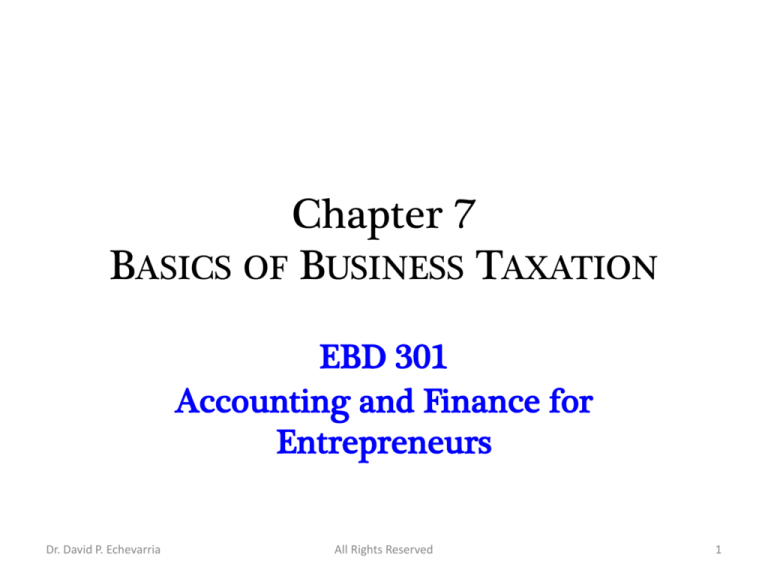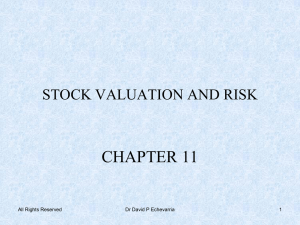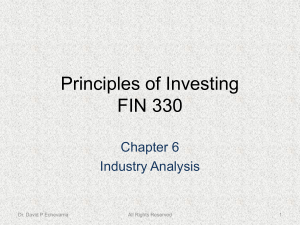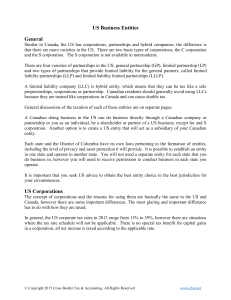
Chapter 7
BASICS OF BUSINESS TAXATION
EBD 301
Accounting and Finance for
Entrepreneurs
Dr. David P. Echevarria
All Rights Reserved
1
Introduction
IRS Publications – New Employers
•
IRS Publication 15 (Circular E), Employer’s
Tax Guide (2014)
o
o
•
EINs, Defining Employees, Paying Payroll Taxes
Rules for Submitting Form 941 or 944 (when advised
by IRS to do so)
IRS Publication 334 Tax Guide for Small
Business
o
Obligations as an employer
Dr. David P. Echevarria
All Rights Reserved
2
BUSINESS OR HOBBY?
Hobbies are considered an activity not
engaged in for profit.
IRS Code section 183 limits the legal
deductions that can be taken for a hobby.
•
Guidelines to determine if business or hobby
o
o
o
o
Do you depend on income?
Have you made efficiency changes?
Have you earned profits in 3 of last 5 years?
If activities not made for profit, IRS will disallow
deductions
See IRS Publication 535, Business Expenses
Dr. David P. Echevarria
All Rights Reserved
3
Election for Husband and Wife
Unincorporated Businesses
Unincorporated business jointly owned by
a married couple is generally classified as
a partnership for Federal tax purposes.
•
Extensive tax filing requirements
Qualified Joint Venture (Public Law 110-28)
•
•
Only members are a husband and a wife filing
a joint return – can elect to not be treated as a
partnership.
Each spouse must report share of income
Dr. David P. Echevarria
All Rights Reserved
4
Qualified Joint Venture
(1) the only members of the joint venture
are a husband and wife who file a joint
return,
(2) both spouses materially participate in
the trade or business, and
(3) both spouses elect not to be treated as
a partnership.
Spouses make the election on a jointly
filed Form 1040
Dr. David P. Echevarria
All Rights Reserved
5
Qualified Joint Venture
Both spouses must divide all items of
income, gain, loss, deduction, and credit
between them in accordance with each
spouse’s respective interest in the joint
venture, and
Each spouse filing with the Form 1040 a
separate Schedule C (Form 1040), Profit or
Loss From Business (Sole Proprietorship)
•
May also be required to file Schedule SE (SelfEmployment Tax)
Dr. David P. Echevarria
All Rights Reserved
6
Qualified Joint Venture
Husband and Wife organized as LLC
•
A business owned and operated by the spouses
through a limited liability company does not
qualify for the election as a Q.J.V.
An EIN is not required unless the QJV is
required to file excise, employment,
alcohol, Tobacco, or Firearms returns.
•
If an EIN is required, the filing spouse should
complete a Form SS-4 and request an EIN as a
sole proprietor.
Dr. David P. Echevarria
All Rights Reserved
7
S Corporations
S corporations are corporations that elect
to pass corporate income, losses,
deductions and credits through to their
shareholders for federal tax purposes
Shareholders of S corporations report the
flow-through of income and losses on
their personal tax returns and are assessed
tax at their individual income tax rates.
(avoids double taxation of income)
Dr. David P. Echevarria
All Rights Reserved
8
S Corporations
To qualify for S corporation status, the
corporation must meet the following
requirements:
•
•
Be a domestic corporation
Have only allowable shareholders
o
o
•
•
•
including individuals, certain trust, and estates and
may not include partnerships, corporations or non-resident
alien shareholders
Have no more than 100 shareholders
Have one class of stock
Not be an ineligible corporation
o
i.e. certain financial institutions, insurance companies, and
domestic international sales corporations
Dr. David P. Echevarria
All Rights Reserved
9
S Corporations
S corporations file their Federal income taxes
using form 1020S.
•
•
•
must also prepare Schedule K-1 as required.
K-1 identifies each shareholders share of current
year’s income
Shareholders must also file a Schedule E, Part II,
Income or Loss
If they have employees
•
S corporations must also file a Form 941,
Employer’s Quarterly Federal Tax Return and
Form 940, Employer’s Annual Federal
Unemployment (FUTA) Tax Return
Dr. David P. Echevarria
All Rights Reserved
10
S Corporations
In order to become an S corporation, the
corporation must submit Form 2553
Election by a Small Business Corporation
(PDF) signed by all the shareholders.
•
The instructions for Form 2553 specify all the
required information as well as where to file
the form.
Dr. David P. Echevarria
All Rights Reserved
11
C Corporations
Corporations must file Form 1120
whether or not they have taxable income
or are in bankruptcy proceedings.
The returns must be signed and dated by
any of the following corporate officers;
President, vice president, treasurer,
assistant treasurer, chief accounting
officer, or any other corporate officer
authorized to sign.
Dr. David P. Echevarria
All Rights Reserved
12
C Corporations
Corporations must pay any tax due by the
15th day of the third month after the end
of the tax year. In addition, corporations
must use electronic funds transfers (EFT)
to make all federal tax deposits.
These deposits are made using the
Electronic Federal Tax Payment System
(EFTPS). Deposits must be initiated by 8
PM eastern time on the day before the
deposit is due
Dr. David P. Echevarria
All Rights Reserved
13
Partnerships
IRS publication 541 Partnerships, provides
supplemental federal income tax
information for partnerships and partners.
•
•
•
File Form 1065, U. S. Return of Partnership
Income
Must also file Schedule K-1 (Form 1065)
Taxes are paid on flow through of profits to the
partners who in turn attach the K-1 to their
individual Form 1040 US Individual Income
Tax Return
Dr. David P. Echevarria
All Rights Reserved
14
IRS Publications of Interest
to Partnerships
1.
2.
3.
4.
5.
6.
7.
8.
9.
334: Tax Guide for Small Business
505: Tax Withholding and Estimated tax
535: Business Expenses
537: Installment Sales
538: Accounting Periods and Methods
544: sales and Other Dispositions of Assets
551: Basis of Assets
925: Passivity and At-Risk Rules
946: How to depreciate Property
Dr. David P. Echevarria
All Rights Reserved
15
Family Partnership
Members of a family can be partners. IRS Publication
541 (December 2013) states that family members (or
any other person) will be recognized as partners if at
least one of the following requirements is met
1.
•
“If capital is an income producing factor, they acquired
their capital interest in a bona fide transaction (even if by
gift or purchase from another family member), actually
owned the partnership interest, and actually control the
interest.”
“…Capital is a material income-producing factor if a
substantial part of the gross income of the business comes
from the use of capital. For example: If the business
requires significant inventories or investments in plant,
machinery, or equipment.”
Dr. David P. Echevarria
All Rights Reserved
16
Family Partnership
2.
•
“If capital is not the material income-producing
factor, they joined together in good faith to
conduct a business. They agreed that the
contributions of each entitles them to a share in
the profits, and some capital for service has been
or is provided by each partner.”
“…Capital is not material income-producing factor
if the income of the business consists principally
of fees, commissions, or other compensation for
personal services performed by members or
employees of the partnership.” (Pages 2, 3, Pub.
541)
Dr. David P. Echevarria
All Rights Reserved
17
Limited Liability Companies (LLC)
•
•
The IRS defines a limited liability company
“…as a business entity organized in the United
States under state law. (Page 2, Pub. 3402, dated
March 26, 2010).
“…an LLC may be classified for federal
income tax purposes as a partnership,
corporation, or any entity disregarded as
separate from its owner by applying the rules
and regulations section 301.7701–3.”
Dr. David P. Echevarria
All Rights Reserved
18
Limited Liability Companies (LLC)
The default treatment is as a partnership
•
“…An LLC with only one member is treated as
•
An LLC with at least 2 members and classified
as a partnership must file form 1065. Only a
member or manager of an LLC can sign the
partnership tax return.
an entity disregarded as separate from its
owner for income tax purposes (but as a
separate entity for purposes of employment
tax and certain excise taxes).
Dr. David P. Echevarria
All Rights Reserved
19
Limited Liability Companies (LLC)
If an LLC elects to be classified as a
corporation, even if it has just one member, it
must file a Form 8832, Entity Classification
Election. The LLC may decide to be taxed as
an S corporation.
Subsequent elections possible
•
Partnership to Corporation:
o
treated as if the partnership contributed all of its assets
and liabilities of the corporation in exchange for stock in
the partnership and then immediately liquidated by
distributing the stock to its partners.
Dr. David P. Echevarria
All Rights Reserved
20
Limited Liability Companies (LLC)
•
Corporation to Partnership
o
•
Corporation to disregarded entity
o
•
treated as if the corporation distributed all of its assets
and liabilities to its shareholders in liquidation and the
shareholders then immediately contributed all the
distributed assets and liabilities the new partnership
treated as if the corporation distributed all of its assets
and liabilities to its single owner in liquidation
Disregarded entity to corporation
o
treated as if the disregarded entity contributed all its
assets and liabilities of the corporation in exchange for
stock.
Dr. David P. Echevarria
All Rights Reserved
21
IRS HELP AND RESOURCES
IRS: http://www.irs.gov/Help-&-Resources
SBA:
http://www.sba.gov/category/navigationstructure/starting-managingbusiness/starting-business/establishingbusiness/taxes
Dr. David P. Echevarria
All Rights Reserved
22



